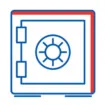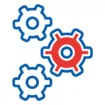Let’s face it, modern businesses rely on computer technology to manage nearly all critical operations, and keeping that technology up to date can be challenging. Servers are the heart of IT infrastructure, but many businesses make the mistake of waiting too long to replace outdated equipment simply because the current system is still functioning. This puts your business and your customers at risk.
Here are some of the reasons why your outdated server software and hardware needs an upgrade even if it hasn’t stopped working.
Poor Security
Microsoft stated that 70-80% of the top 10 malware infections could be avoided entirely by simply operating up-to-date technology. Outdated server software opens your business to vulnerabilities that cybercriminals already know how to exploit.
Microsoft ended support for a number of Windows Server versions as of the dates below:
- Windows Server 2003 – 7/14/2015
- Windows Server 2008 – 1/14/2020
- Windows Server 2008 R2 – 1/14/2020
- Windows Server 2012 – 1/14/2020
Servers that run unsupported operating systems like these are much more vulnerable to cyberattacks since the “bad guys” know where the vulnerabilities of these operating systems lie and write malicious code to exploit them. Microsoft provided ample warning time for the end of life support on these operating systems, and will not be doing any further updates to protect you from those vulnerabilities.
Keeping servers for 6, 7 or more years is another mistake that opens your business to unnecessary risk, since older servers may not be capable of supporting the modern operating systems that are capable of receiving regular security updates. Do you know if your server’s OS is currently supported by the manufacturer?
As an aside, but very relevant, in 2019, Forbes reported that 32% of companies operate with Windows XP in a prominent position within their IT infrastructure. Nearly 79% were relying solely or in-part on Windows 7. Microsoft stopped supporting Windows XP on April 8, 2014, and Windows 7 on January 14, 2019. That means no more security patches are being created for these workstation operating systems. This is the ideal entry point for malware and crypto-ware that can cost thousands of dollars to recover from!
Reduced Functionality
Operating outdated servers ultimately reduces your functionality. As your on-site server equipment ages, it will quickly become incapable of supporting the latest versions of your critical business process software. This could result in downtime for you and your customers or missed opportunities to implement new features that streamline business processes. In today’s fast-paced marketplace, efficiency directly impacts the bottom line and your ability to remain competitive.
Ongoing Costs
Many businesses that opt for on-premise servers assume their investment offers a good total cost of ownership. This “set it and forget it” assumption fails to consider the ongoing expenses required to safely and securely maintain and support the system over time. The lifespan of the average server is just 3 – 5 years. If your business relies on on-site servers, you will need to hire a dedicated IT staff to constantly upgrade, patch, and tweak that equipment to maintain optimal performance.
Compliance Risks
Businesses in highly-regulated industries are subject to many security and privacy regulations related to customer data and payment information. Outdated equipment puts regulated data at risk could lead to fines and legal repercussions. Service industries are at the greatest risk, but this situation may apply to any industry that manages or transfers sensitive customer information.
Eliminate These Risks with Cloud Hosting
Thankfully, there is a cost-effective solution to all of the issues above – Cloud Hosting. With a Dedicated Cloud Hosting service, your server technology is always kept up to date with the latest hardware and software upgrades. That means you’ll always have the ability to operate the latest version of your server software as well as operational software like Macola and SAP Business One. Ongoing maintenance and equipment upgrades is already included, which keeps you out of the IT business and eliminates the associated workforce and technology expenses. Disaster recovery and 24/7 support ensure the lowest downtime possible so your business isn’t held hostage by equipment failure.
Consider cloud hosting before you invest in another on-site upgrade that will require constant attention to remain up to date. Click here for more information about transitioning ERP systems like Macola in the cloud or visit our FAQ page for answers to the most common questions.
Through the Attivo Dedicated Cloud, we have helped clients regain control of their company’s through world-class business management systems and significantly reduce costs. If you have questions about cloud hosting and how the Attivo Group can help effectively transition your business give us a call at 877-428-8486.





















